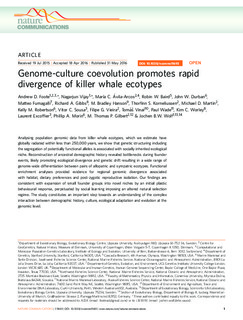| dc.contributor.author | Foote, Andy | |
| dc.contributor.author | Vijay, Nagarjun | |
| dc.contributor.author | Avila-Arcos, Maria | |
| dc.contributor.author | Baird, Robin | |
| dc.contributor.author | Durban, John | |
| dc.contributor.author | Morin, Phillip | |
| dc.contributor.author | Fumagalli, Matteo | |
| dc.contributor.author | Gibbs, Richard | |
| dc.contributor.author | Hanson, Bradley | |
| dc.contributor.author | Korneliussen, Thorfinn | |
| dc.contributor.author | Martin, Michael D. | |
| dc.contributor.author | Robertson, Kelly | |
| dc.contributor.author | Sousa, Vitor | |
| dc.contributor.author | Vieira, Filipe G. | |
| dc.contributor.author | Vinar, Tomas | |
| dc.contributor.author | Wade, Paul | |
| dc.contributor.author | Worley, Kim | |
| dc.contributor.author | Excoffier, Laurent | |
| dc.contributor.author | Gilbert, M Thomas P | |
| dc.contributor.author | Wolf, Jochen B W | |
| dc.date.accessioned | 2020-03-05T14:09:04Z | |
| dc.date.available | 2020-03-05T14:09:04Z | |
| dc.date.created | 2016-06-14T13:45:32Z | |
| dc.date.issued | 2016 | |
| dc.identifier.issn | 2041-1723 | |
| dc.identifier.uri | http://hdl.handle.net/11250/2645559 | |
| dc.description.abstract | Analysing population genomic data from killer whale ecotypes, which we estimate have globally radiated within less than 250,000 years, we show that genetic structuring including the segregation of potentially functional alleles is associated with socially inherited ecological niche. Reconstruction of ancestral demographic history revealed bottlenecks during founder events, likely promoting ecological divergence and genetic drift resulting in a wide range of genome-wide differentiation between pairs of allopatric and sympatric ecotypes. Functional enrichment analyses provided evidence for regional genomic divergence associated with habitat, dietary preferences and post-zygotic reproductive isolation. Our findings are consistent with expansion of small founder groups into novel niches by an initial plastic behavioural response, perpetuated by social learning imposing an altered natural selection regime. The study constitutes an important step towards an understanding of the complex interaction between demographic history, culture, ecological adaptation and evolution at the genomic level. | nb_NO |
| dc.language.iso | eng | nb_NO |
| dc.publisher | Nature Research | nb_NO |
| dc.rights | Navngivelse 4.0 Internasjonal | * |
| dc.rights.uri | http://creativecommons.org/licenses/by/4.0/deed.no | * |
| dc.title | Genome-culture coevolution drives rapid divergence in the killer whale | nb_NO |
| dc.type | Journal article | nb_NO |
| dc.type | Peer reviewed | nb_NO |
| dc.description.version | publishedVersion | nb_NO |
| dc.source.volume | 7 | nb_NO |
| dc.source.journal | Nature Communications | nb_NO |
| dc.identifier.doi | 10.1038/ncomms11693 | |
| dc.identifier.cristin | 1361449 | |
| dc.description.localcode | This work is licensed under a Creative Commons Attribution 4.0 International License. The images or other third party material in thisarticle are included in the article’s Creative Commons license, unless indicated otherwisein the credit line; if the material is not included under the Creative Commons license,users will need to obtain permission from the license holder to reproduce the material. To view a copy of this license, visit http://creativecommons.org/licenses/by/4.0/ | nb_NO |
| cristin.unitcode | 194,31,10,0 | |
| cristin.unitname | Institutt for naturhistorie | |
| cristin.ispublished | true | |
| cristin.fulltext | original | |
| cristin.qualitycode | 2 | |

